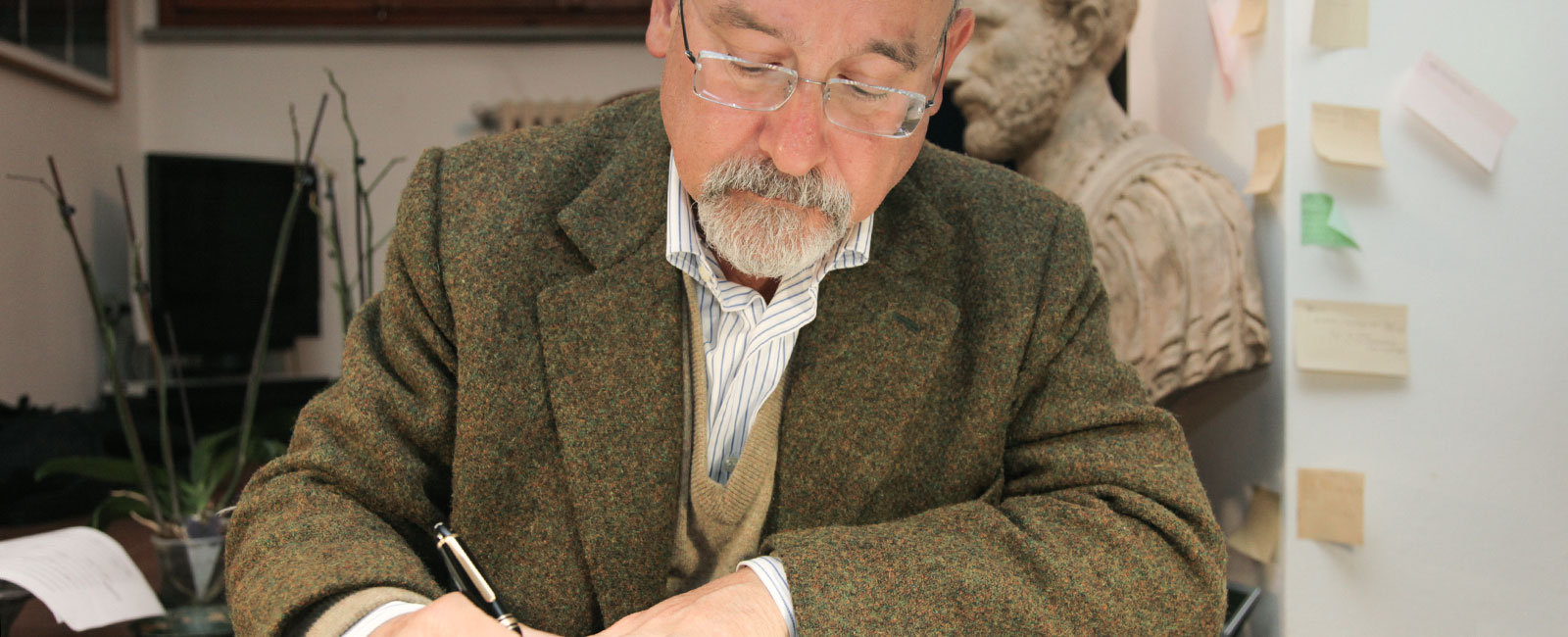Sciarrino wins the BBVA Foundation Frontiers of Knowledge Award in Contemporary Music for developing a new syntax that renews the possibilities of instrumental and vocal music
The BBVA Foundation Frontiers of Knowledge Award in the Contemporary Music category goes in this fourth edition to Italian composer Salvatore Sciarrino (Palermo, 1947) for “renewing the possibilities of instrumental and vocal music and the differentiation of their sound materials,” in the words of the jury’s citation.
14 February, 2012
The jury remarked of Sciarrino that he “has developed a new and unique syntax” and that “at the heart of his creations is his way of combining extreme reduction with a richness of detail. He stands out for his use of microtonality and his conscious reworking of ideas and materials from past periods and cultures.”
Sciarrino filters and reconstructs pieces created according to the canons of the past.
An illustrative example are what Sciarrino calls his “elaborations” of the music of earlier authors, like his La terribile e spaventosa storia del Principe di Venosa e della bella Maria based on music by Gesualdo, his reworking for solo flute of Bach’s Toccata and Fugue in D minor for organ, or his versions of works by Scarlatti, Mozart, Mendelssohn, Ravel and contemporary artists like the Beatles. In these elaborations, Sciarrino filters and reconstructs pieces created according to the canons of the past, at times lending them a sonic surrealism with an aesthetic significance at several removes from the source material.
According to the jury chairman, Jürg Stenzl, “Sciarrino’s originality lies not so much in the creation of new sounds as in the development of a syntax that pulls them coherently together.” His work, he adds, “has enriched contemporary music by way of detail rather than grandiloquent sounds. His impact can be seen in the music being made today, but will also radiate out to the rest of the century.”
The composer believes that “the distance between classical, traditional and contemporary music is not that great. I personally feel that it is essential to understand the roots of our identity that lie in tradition.”
Connection between music and literature
His writing style is characterized by a lightness, refinement and sound poetry that mark him out as an original composer with a distinct personality.
The language he uses in his works tests the limits of instrumental virtuosism through the use of non-conventional techniques, where the performer narrates each moment of the story. David Metzer, Professor of Musicology at Yale University refers to Sciarrino as “a master calligrapher of quiet,” while the composer himself has written that “sound has an intimate relationship with silence, and the consciousness of that connection is new.” In his work, Sciarrino has explored different ways to model this relation between sound and stillness, with passionate characters who fracture silence with cries and outbursts, not so much embracing silence as reacting to it.
Self-taught and precocious
Born in Palermo (Italy) in 1947, Salvatore Sciarrino will celebrate his 65th birthday on April 4 this year. As a child he felt drawn towards the visual arts, but soon began to experiment with music. At the age of twelve he wrote his first composition and by age fifteen had premiered his first concert. Despite some brief studies with Antonio Titone and Turi Belfiore, and his time in Rome attending Franco Evangelisti’s electronic music course at the Accademia di Santa Cecilia, Sciarrino is very much a self-taught artist.
From 1974 to 1996, he combined his teaching work at the conservatories of Milan, Florence and Perugia with numerous master classes and international courses. In 1982, he decided to concentrate on his art and settled in Città di Castello, in the Umbria region, where he spends most of his time composing. He has nevertheless continued to teach sporadically, including specialization courses in Città di Castello attended by rising composers like Francesco Filidei, Lucia Roncheti, Fabrizio de Rossi Rei and Maurizio Pisati.
His prolific output has resulted in more than 180 compositions that can be heard on some 70 discs. His exceptionally broad and varied catalogue ranges from works for solo instrument though to symphonies and theater music. He has composed for the London Symphony Orchestra, the Frankfurt Opera Theater, the Fenice in Venice and Tokyo’s Suntory Hall, and his works have been played at leading contemporary music festivals: Salzburg, New York, Vienna, Berliner Festspiele Musik, Festival d’Automne (Paris) and Ultima (Oslo), to name but a few.
Director of the Teatro Comunale di Bologna between 1978 and 1980, he is a member of the Accademia di Santa Cecilia (Rome), the Bavarian Academy of Fine Arts and the Berlin Academy of Fine Arts.
International jury
The jury in this category was chaired by Jürg Stenzl, professor at the University of Salzburg (Austria), with Siegfried Mauser, President of the University of Music and Performing Arts in Munich (Germany) acting as secretary. Remaining members were composer and conductor Gilbert Amy (France), Hugues Dufourt, composer and Emeritus Research Director at the Centre National de la Recherche Scientifique (France), Rudolf Frisius, composer and Emeritus Professor of Musicology at the University of Karlsruhe (Germany), composer and conductor Cristóbal Halffter, winner of the same award in the 2009 edition, Ranko Markovic, Artistic Director of Konservatorium Wien University (Austria) and Dieter Torkewitz, composer and Professor of Music Theory at the University of Music and Performing Arts in Vienna (Austria).


